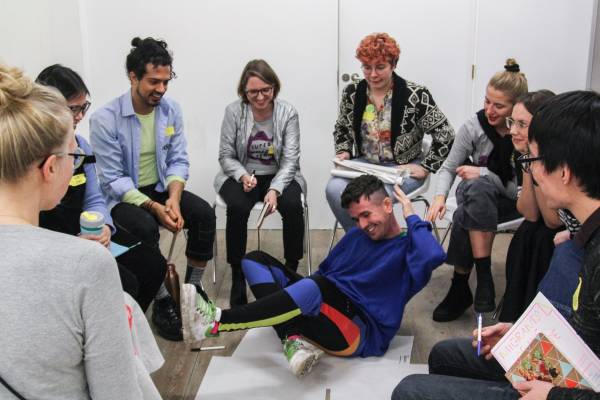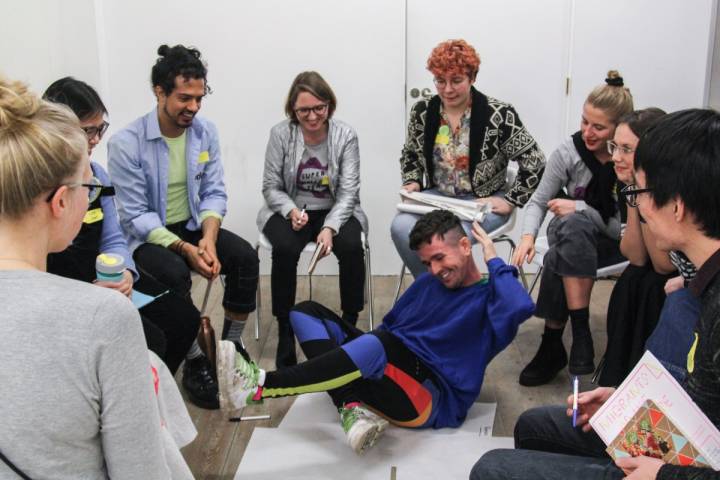
A pilot programme exploring models of migrant-led mentorship
Migrants in Culture and Artsadmin are collaborating on a pilot / research project exploring migrant-led mentorship for the cultural sector.
This is a programme about navigating the existing system and building a new one: it’s about embedding support systems for migrant artists into existing institutions and researching how migrant knowledge and methodologies can instigate new forms of institutional support.
The programme is a form of resistance to specific obstacles migrants face in the sector, created with awareness of how other forms of marginalisation, including through race, ability, gender, sexuality or class, intersect with experiences of migration.
About Migrants in Culture
Migrants in Culture is a network of migrants organising to create the conditions of safety, agency and solidarity in the culture sector for migrants, people of colour and all others impacted by the UK’s immigration regime.
http://migrantsinculture.com/
@migrantsinculture
‘Migrant’ refers to people who work in the cultural sector, have lived experiences of migration in their lives, are being profiled as migrants because of the colour of their skin, their accent or other characteristics, regardless of their legal status. Migrants can have a variety of legal statuses, including as visa nationals, temporary or permanent residents, refugees or asylum seekers, traveller communities, those undocumented or otherwise illegalised, or citizens.
The questions guiding this pilot are:
- What forms and shapes of mentorships do migrant artists need and want?
- How can mentorship respond to and be built on experiences of artists and cultural workers with trauma of displacement and disenfranchisement?
- How can we use the existing support systems – built within a cultural sector that is hostile to migrants – to imagine and design new migrant- led ones?
Who is involved in the project
- Two mentors, established artists with lived experience of migration, a live art/performance and activist practice. Invited. (Basel Zaraa and Istanbul Queer Art Collective)
- Six mentees, emerging artists with lived experience of migration, live art/performance and activist practice. Invited. (TBD)
- Migrants in Culture (Bojana Janković, Diana Damian Martin)
- Artsadmin (Valentina Vela, Nene Camara)
- Migrants Organise (Francesca Valerio)
What happens
Each mentor is paired with three mentees, for one hour-long session. Mentors are asked to bring in a specific question to their session (we can send suggestions / guidelines)
The group (mentors + mentees) also hold a joint collective mentorship session. These continue on from the individual session, finding collective answers to the questions brought into the process.
These sessions should/could consider: practical resources, migrant methodologies (e.g. of making work, mentorship, support), safeguarding. They build on existing Artsadmin support sessions, but within this structure should be shaped by the mentors and mentees.
The programme ends in a reflective Radar session, led by mentees. This session opens up the programme to the public, and focuses on the pilot learnings and commitments: what worked, what did not, what should we collectively try next time?
What does success look like?
- Artadmin and MiC have encountered and supported new artists; new relationships are formed in the mentor-mentee group
- We have collected material for the Migrant Resource Platform
- We have new ideas / input on mentor-led mentorship: we know what the next steps might look like and what we need to make them happen.
- Mentors and mentees feel like they have shaped the programme
- Outputs: Radar sessions, potentially a reflective writing / evaluation as part of it
Key principles / ideas
- Migrant-led
- Migrancy as an art and activist practice
- Building new – not just reforming the old
- Embedding knowledge of migrant routes and routes into institutional support systems
| Date | Title | Venue | City |
|---|---|---|---|
| 18 October 2022 | Radar: Imagining structures of support for migrant artists |

